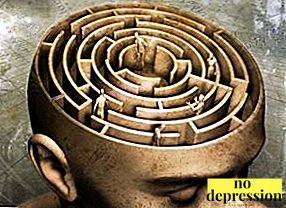In modern society so appreciated by thinnessthat her relationship with the word “bad”, that is bad, is completely forgotten.
Striving for it can really lead to terrible consequences: About one in 22 women suffer from anorexia nervosa, or have had episodes of its manifestation in the past. Moreover, the mortality from this disease is 5-10%.
What is this disease?

Who are anorexics?
In general, anorexia is lack of appetite or unwillingness to eat while the body has an objective need for food.
Anorexia can be both an independent disease (and due to the prevalence of low-weight fashion is now most known for this quality), and a symptom of other disorders digestive and nervous systems.
Types of anorexia
In the first case, it is associated with conscious restriction of oneself in food, regardless of physiological needs, in the second case I just do not want to eat: a person forgets about food or loathes her.
This may be a sign:
- violations of hormone levels (for example, an excess of serotonin and dopamine, affecting hunger centers),
- pathologies of a neurological nature (brain damage, concussion, etc.),
- cancer.
That is, if you do not want to eat, not because you are losing weight - this is an occasion to urgently run to a neuropathologist.
If because you are losing weight - to a psychologist or even a psychiatrist, this neurotic anorexia, or anorexia neurosis. Both names are equal, the second - the transliterated spelling of the Latin name of the disease.

Nervotic (anorexia) anorexia is an eating disorder characterized by excessive restriction of food or its complete abandonment and caused by the patient’s targeted desire to reduce weight.
Anorexia is dangerous because alimentary insufficiency develops: All those biologically active substances that are necessary for normal functioning do not enter the body.
The result is a violation of the heart, blood circulation, excretory system, which can lead to death.
Is it a mental illness?
AT international classification of diseases Anorexia nervosa is presented and belongs to section V ("Psychiatric and behavioral disorders"), but belongs to classes F50-F59 - "Behavioral syndromes associated with physiological disorders and physical factors."
Thus, it can be attributed to both psychiatric and psychological problems.
Psychic anorexia - it is loss of appetite or restriction of oneself in food, associated with existing disorders, most often obsessive-compulsive (obsessive thoughts of fullness are visited and rituals associated with eating or refusing it, become a reaction to them), with schizophrenia (when do not eat whispering some voices), dysmorphophobia.

Psychological Anorexia - This is the absence or suppression of appetite for psychological reasons (discomfort from its appearance, not acquired the nature of the disease; a defense mechanism for some shocks, for example, parting with a young man, etc.).
The difference from the first type is that it is caused not by a pathological disorder, but by problems that are quite easily corrected by psychotherapy, often even without taking pharmacological drugs.
Psychogenic anorexia - Another term for this disease, but it describes its origin: from psychological and mental causes, not physiological factors such as changes in hormone levels or injuries.
Difference with bulimia
Bulimia - A close friend of the described disease, in ICD-10 they are referred to the same class of diseases and often accompany each other.
But if anorexia is a refusal to eat, and bulimia is a pathological overeating, a breakdown when a person eats a huge amount of food and cannot stop.
When patients refuse to eat, they often experience such breakdowns - the body still needs its own, but the brain has almost no control over the processso food is absorbed too much.

After that, the patient feels guilty, hates for weakness, tries to get rid of eaten, causing vomiting, drinking laxatives and diuretics.
If an ordinary person's stomach after a meal can stretch to three or four liters, then for “experienced girls-bulimichek” - almost 2.5 times more. This leads to serious violations in the work of internal organs.
Causes and psychology
What causes anorexia in men, women, and children? Researchers identify several risk factors for development anorexia:
- Genetic - disorders in the genes responsible for the development of neurochemical factors of eating behavior, a predisposition to affective and anxiety disorders, dysfunction of neurotransmitters, primarily serotonin and dopamine.
- Biological - dysfunction of the already mentioned neurotransmitters, excess weight.
- Family - the presence of relatives suffering from this syndrome, depression or abuse of drugs and alcohol.
- Personal - personality type, prone to perfectionism, low self-esteem.
- Cultural - attribution to the cultures where thinness is valued (first of all European, in the East frankly full women are considered beautiful, in Latin America “juicy” with forms).
- Age - adolescence and youthful age.

From a psychological point of view can be identified a few reasonsthat lead to the development of the syndrome:
- Dissatisfaction with own appearance (which is especially common at a young age), followed by a passion for diets, which grows into too much.
- Psychological protection from traumatic factors (when in childhood they were called “fat” or “fat”, parting with a partner, etc.),
- Striving for excellence (“I am better than you, because I can control hunger”, “I am a spiritual creature, because I can cope with the vile instinct of food”)
- The need for control as mental protection from feelings of helplessness, resulting from the loss of this very control in important life situations (“I have a complete mess in my life, I cannot solve the problems with housing and work, but I will completely control the meals”).
How to start: first signs
Anorexics themselves, like alcoholics, do not recognize themselves as sick until the ambulance takes them away. after starving fainting or heart attack.
However, even here they do not consider that they have a certain psychological pathology, but they are beginning to be treated, sometimes even forcibly.
To save a person can his inner circle if you will be attentive to him.
How is anorexia manifested? Initial signs on which worth paying attention to:
- Sharp weight loss. However, it is not always observed, as anorexia is often accompanied by compulsive overeating and slowing down the metabolism.
- Passion for a variety of diets.
- Skip meals.
- Passion for "healthy food", cooking: often prepare huge meals for loved ones, but do not eat.
- Preference for certain foods, usually low-calorie foods or advertised as dietary,
- Restriction of social contacts, as at meetings they offer to drink tea with cake, to go for a snack; a grandmother can begin to fatten a drawn granddaughter or granddaughter, etc.
- Lower daily activity (due to malnutrition, less strength), often accompanied by fanatical exercise.
- Frequent and prolonged visits to the toilet (as a consequence of taking diuretics and laxatives, attempts to induce vomiting).
- Drastic mood swings from euphoria to sadness, increased irritability.
- Entry to thematic public in social networks, subscription to newsletters, LJ.

If you notice such changes, try to talk to the person and find out what is happening, take him to a psychotherapist before you have to go to psychiatrists.
And remember: people who look outwardly exhausted can also be ill.
Stages, degrees and symptoms
There are several stages of the disease:
- Dysmorphic - constant thoughts about their inferiority due to excess weight - real or imaginary, the search for diets.
- Anorectic - 20-30% of body weight leaves, body mass index becomes normal or reduced, a person looks thin, but it seems to him that he needs to lose more. The first physical consequences come: it is constantly cold, the skin becomes dry, the hair falls out, the blood pressure decreases, the pulse slows down.
- Kahekticheskaya - internal organs are irreversibly degraded due to malnutrition. Weight increases compared with the anorectic stage due to edema. As a rule, it is already impossible to cure the last stage, which leads to death.

At the first two stages, the physiological consequences can be eliminated with the right treatment, at the second - strictly inpatient.
Dysmorphic stage may not manifest in physical symptoms, in addition to weight loss, and on the anorectic they already appear:
- the absence of a monthly cycle and a decrease in libido in women, problems with male potency in men,
- weakness,
- chronic fatigue syndrome
- ragged heart rhythm
- cramps and cramps.
Implications for the body

The physical effects are very diverse.
The worst of them are disorders in the work of the cardiovascular system due to the lack of magnesium and potassium necessary for the functioning of our “motor” - up to sudden cardiac death.
This dizziness and fainting, hair loss and brittle nails, overgrowing of the back and face with small hairs are not at all like the ideal of beauty, the patient aspires to.
This is constant nausea, constipation and stomach pain, to the extent that stops taking regular food.
This decrease in brain mass, brittle bones and weak tendons, which leads to permanent injury. These are hormonal disorders - first of all from the side of the thyroid gland.
What doctor treats?
When there are no clearly expressed physical consequences, the disease will cope psychotherapist.
It is necessary to identify the psychological reasons for striving for a minimum weight, to conduct their psychocorrection, and the person will recover. Effective cognitive-behavioral psychotherapy, family psychotherapy.
But when the whole body suffered, psychologist - only one of the participants in the healing process. The patient is placed in a hospital where he is observed by nutritionists, cardiologists, endocrinologists, and gastroenterologists.
How to handle: treatment methods

What to do?
In the first stage of the disease can help elementary talk heart to heart with loved ones, a demonstration of love, affection, acceptance of a person as he is, attempts to find for him entertainment and hobbies.
If this does not help - psychotherapist.
In the second stage, the most important isfill nutrient deficienciestherefore, the patient is forcibly fed: parenterally (solutions of amino acids and glucose in droppers), specialized medical nutrition, regular food, if the gastrointestinal tract is able to take it.
When he is not in serious condition, is needed psychotherapy.
How to avoid this: Prevention
If you are already decided to lose weight, set yourself a clear realistic goal in kilograms, and preferably in centimeters, and this is real, and not understated.
Understand that this process is not simultaneous, that weight loss will be a lengthy process that cannot be forced.
Find a slimming partner who will motivate and support. Do not submit to this goal all your life. - find time for entertainment.
The best way to avoid anorexia is feel like a complete person with their own interests and a rich inner world, not just a body that should be perfect.
Psychotherapy of anorexia nervosa:



